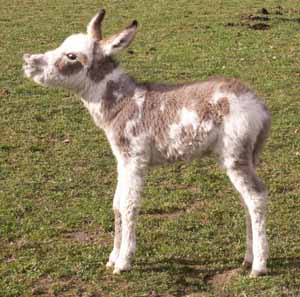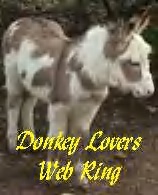


 |
 |
 |
Donkey Purchase Plan |
Donkey Purchase Plan I WILL BE GLAD TO HOLD YOUR DONKEYS FOR YOU UP TO THIRTY DAYS. FOALS WILL BE HELD AT NO ADDITIONAL CHARGE UNTIL THEY ARE OLD ENOUGH TO BE WEANED...USUALLY BETWEEN 5 TO 6 MONTHS. DEPOSITS ARE NON-REFUNDABLE BUT I WILL APPLY YOUR DEPOSIT TO ANOTHER DONKEY IN CERTAIN SITUATIONS. I WILL NOT CHARGE YOU BOARD UNLESS WE HOLD THEM 10 DAYS PAST THE DATE OF PURCHASE OR 10 DAYS PAST THE DATE THE FOALS ARE WEANED. DONKEYS MUST BE PAID FOR IN FULL BEFORE THEY LEAVE THE FARM UNLESS OTHER ARANGEMENTS HAVE BEEN MADE. BOARD IS $5.75 PER DAY. DISCOUNTS MAY BE GIVEN IF PURCHASING MORE THAN ONE DONKEY. DONKEYS ARE HAPPIER WHEN PAIRED UP SO I WILL GLADLY MAKE PRICING ALLOWANCES TO KEEP BONDED PAIRS TOGETHER. IF YOU LIVE IN WASHINGTON STATE YOU WILL NEED TO SIGN A TAX EXEMPT FORM TO AVOID PAYING SALES TAX WHICH I WILL PROVIDE AND KEEP ON FILE. MY DONKEYS HAVE BEEN SHIPPED TO SEVERAL STATES THROUGHOUT THE U.S., CANADA, ALASKA, HAWAII AND EUROPE AND I ASSIST OUR CUSTOMERS IN ARRANGEING THERE TRANSPOTATION. ALL MY BREEDING ANIMALS SOLD OUT OF STATE WILL NEED A NEGATIVE COGGINS TEST AND HEALTH CERTIFICATE PROVIDED BY A VETERNARIAN WHICH IS PAID FOR BY THE PURCHASER WHICH I WILL HELP ARANGE. FOR OUR BREEDING ANIMALS I WILL PROVIDE ; PEDIGREES; ONE TO TWO SETS OF REGISTRATION PAPERS (MDR - MINIATURE DONKEY REGISTRYAND ACOSA - AMERICAN COUNCIL OF SPOTTED ASSES...if spotted papers applicable); COMPLETE HEALTH RECORDS; A HALTER AND LEAD ROPE; A BOOK TO HOLD ALL RECORDS A LEFT & RIGHT SIDE PHOTO READY TO SEND IN WITH THEIR REGISTRATION TRANSFERS. Deposits When you sign a sales order you have agreed that the Deposit and or down payment should you decide to back out of said agreement is subject to charges of funds to the care of the animals you purchased as well as board against the Deposit and or Down payment we the Seller received during the duration while they are held here for weaning. As a Buyer should you decide to back out of this agreement within three days of signing the sales contract your Deposit and or Down payment will be refunded in full.
PLEASE FEEL FREE TO CALL WE ARE VERY EASY TO WORK WITH
|
|||||||
|
![]()

Miniature Donkey Information Miniature donkeys are native to the Mediterranean islands of Sicily and Sardinia. There are over 45,000 registered miniature donkeys in the United States with importations no longer allowed. As you can see by the small numbers, the breed is still needing to be preserved and cultivated. The miniature donkey is a true breed and is not bred down. The miniature donkey must be under 36" or less at the shoulder. The average height for them is 34", and the smaller they are the more valuable they become. Miniature donkeys have very long life-spans living to 25-35 years of age. The most common color for the miniature donkey is a gray dun with a black "cross" running over their shoulder and down their back. Donkeys do come in colors other than gray such as spotted, brown, black, sorrel. Black and red, however, are very uncommon colors and highly prized in breeding programs. Miniature Donkeys eat one to two flakes of good quality Coastal hay per day. Grains are not often needed by donkeys except for weanlings, pregnant, or nursing jennets A trace mineral supplement should be made available to your donkey at all times. Donkeys love treats such as breads, carrots, and apples. Historically, donkeys are used to sparse food supplies and should not be overfed. Your donkey should have good, clean water 24 hours a day. Donkeys need a three sided loafing shed for protection against the cold north winds of winter and the hot sun of summer. A single miniature donkey needs 1/2 to 1 acre of pasture. Miniature donkeys generally get along with goats, sheep, horses, llamas. Miniature donkeys are one of the most affectionate and friendly animals of their kind. Miniature donkeys are tame, gentle, loyal, playful, and affectionate...the perfect pet. Miniature donkeys are very social animals who like to give and receive a great deal of attention. Miniature donkeys need annual vaccinations for Eastern and Western Encephalomyelitis, Tetanus, Rhinopneumonitis, Strangles, and influenza & the West Nile Vacc. If it is the first time the donkey is receiving the vacc. they will need a booster 3 weeks after the first and then annually there after. Hoof Care should be performed every eight to ten weeks depending, of course, on how rapidly your donkeys hooves grow. Terrain and diet are big factors in hoof growth. Worming should be done every 2 to 3 months. "Jack" is a male donkey that has not been castrated. "Jennet", or "Jenny" as some people say, is a female donkey. "Foal" is a young donkey from birth to the time that they are weaned from their mothers "Weanling" is a young donkey who has been separated, or weaned, from its mother. "Gelding" is a male donkey that has been castrated so that it cannot reproduce. The gestation period of the miniature donkey is 11 to 13 months. The foal averages between 20 to 30 pounds at birth. Foals are up nursing within 30 minutes of birth. Foals are normally weaned between 4 and 6 months. Jennets SHOULD NOT be bred until at least 3years of age. Miniature donkeys are not fully grown until 3 years of age. Everyone who meets a miniature donkey wants one of their own!
|
 |
JF Ranch West Mount Vernon, Washington State Phone 360-202-6996 |
 |
Herd Sires | Brood Jennets | Newborns | Geldings | Donkeys Sold | Donkey Information and Links | Donkeys For Sale | Contact | Home You are now on the donkeypurchase plan page |
This RingSurf Donkey Lovers Ring Site is owned by Julie Jones and Todd Frankenfield.

Next | Previous | Random Site | List Sites | Join the Ring
Send mail to
JFminidonkeys@gmail.com with questions or comments about this web site.
Copyright © 2012 JF Ranch, Last modified: July 8 2012